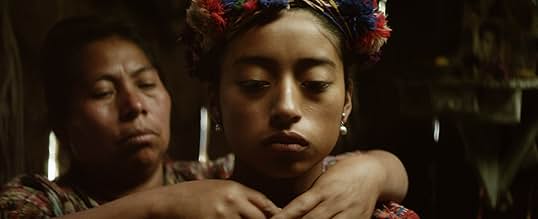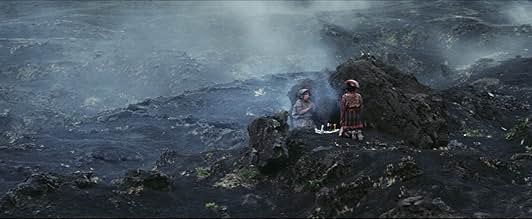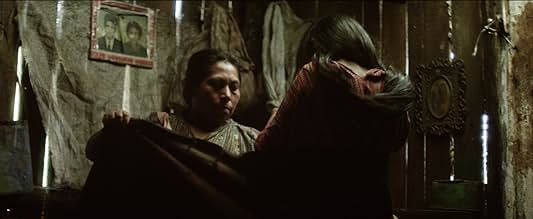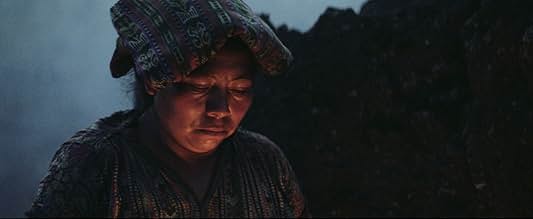IMDb RATING
7.1/10
3.4K
YOUR RATING
On the slopes of an active volcano in Guatemala, a marriage is arranged for seventeen-year-old María by her Kaqchikel parents.On the slopes of an active volcano in Guatemala, a marriage is arranged for seventeen-year-old María by her Kaqchikel parents.On the slopes of an active volcano in Guatemala, a marriage is arranged for seventeen-year-old María by her Kaqchikel parents.
- Awards
- 23 wins & 24 nominations total
- Director
- Writer
- All cast & crew
- Production, box office & more at IMDbPro
Featured reviews
I've long been interested in Mayan mythology and culture, so when I heard about a new movie from Guatemala in the Maya language, I knew it was a film I wanted to see. "Ixcanul" is the Maya word for volcano, which looms large in the film, both physically and as a psychological barrier between this village and the rest of the world.
Maria is a teenage girl, beautiful and bold. She lives with her parents, their only child, on a coffee plantation. Her parents have arranged her marriage to the plantation foreman, but neither seem particularly enthused about it. Instead, Maria dreams of escaping to the United States with a local worker. Despite her best attempts to get Pepe's agreement to take her with him North, she never secures a committed response. Her actions, however, have significant repercussions for her and her family.
This could be a film about the uncaring and unsympathetic corporate owners of the plantations, or it could be about the ignorance of peasant life in the Guatemalan villages, or it could be a film that romanticizes North American culture and lifestyle, but it is none of these things. What it is, is an intimate and honest story of a brief moment in time of a family caught on the crossroads of tradition and modernity. "Ixcanul" is Guatemala's first entry in the Academy Awards for Foreign Language Film, and it certainly deserves to win. I am intrigued by the language and have a few unanswered questions, so it is likely I will pick this one up for the collection when released.
Maria is a teenage girl, beautiful and bold. She lives with her parents, their only child, on a coffee plantation. Her parents have arranged her marriage to the plantation foreman, but neither seem particularly enthused about it. Instead, Maria dreams of escaping to the United States with a local worker. Despite her best attempts to get Pepe's agreement to take her with him North, she never secures a committed response. Her actions, however, have significant repercussions for her and her family.
This could be a film about the uncaring and unsympathetic corporate owners of the plantations, or it could be about the ignorance of peasant life in the Guatemalan villages, or it could be a film that romanticizes North American culture and lifestyle, but it is none of these things. What it is, is an intimate and honest story of a brief moment in time of a family caught on the crossroads of tradition and modernity. "Ixcanul" is Guatemala's first entry in the Academy Awards for Foreign Language Film, and it certainly deserves to win. I am intrigued by the language and have a few unanswered questions, so it is likely I will pick this one up for the collection when released.
The director's feature film debut. From Guatemala, selected to represent the Oscars in the previous year (2016), but did not make. The film was based on the real about a small Mayan family living closer to the active volcano slope working in the coffee plantation. A perfect depiction of hardship of life, but from the perspective of a teenager. The life between adulthood and childhood, and for the lack of the knowledge of the real world, how they are misled was the film's purpose.
I liked the film, no question about that. But it did not start like that. I hate films showing cruelty towards animals. It does not matter livestock, wild animals or anything else. The exception is only for the nature documentaries which does not involve human. So it all started with a strong dislike for the film. I was not sure I about writing a review for it. But the film convinced me with the later parts. I was not expecting it. In the end, I felt a very good film became a just above average because of one bad sequence.
The film follows the character Maria. The seventeen year old girl was promised to the one who works in the city. But she wants to leave the place, country to the United States. That's when she begins to have her sexual urge. Following that, she develops a relationship with a boy from the coffee plantation. The consequence is the bigger price she has to face. With numerous challenges, not just her, but the whole family should overcome it. So how they are prepared for it and other following struggles revealed in the remaining narration.
❝He's probably living in the United States in a big house with a garden, like those in the magazine. He must speak English by now.❞
The film highlights many things. One of those was how the poverty ridden, illiterate people are misguided. The indigenous Guatemalan people that showed in this film really amazed me. Okay, the girl made a mistake, but how her family reacted to it was a surprise to me. Being very cultured, I did not expect that. In fact, I thought it could turn into a thriller, particularly in its finale. But the entire film was a drama and finding a solution to solve the issue as the way it flows. Then comes the misconception which drags the family into more trouble.
At that point of the narration, the film was close to the end. But an unexpected twist made its way. The part where desperation takes the front seat. With all the sudden, everything was resolved, but good or sad is to know, one must watch the film. Like the filmmaker, the casting was also new faces. The storyline seems simple, but where it sets in was the challenge the cast and crew excelled. The original title Ixcanul means volcano in Mayan language, but it is a force looking to explode is the correct definition, that's explained by the director.
It is one of first Guatemalan films for me. I'm very impressed with the story, the performances, locations and the overall film. It is not just a film festival product, it is like any Hollywood or the rest of the world cinema that qualified to call a good film. So if you are watching lots of regular films and got bored, you can try this for a change. A different language, different setting, but a situation every culture, ethnic had seen, that now you can learn how it all confronted by these people. Just like the film 'Tanna', but not all the same. Excluding the opening part I complained about, this is a nice film to check it out. But I won't mention the word recommended!
7/10
I liked the film, no question about that. But it did not start like that. I hate films showing cruelty towards animals. It does not matter livestock, wild animals or anything else. The exception is only for the nature documentaries which does not involve human. So it all started with a strong dislike for the film. I was not sure I about writing a review for it. But the film convinced me with the later parts. I was not expecting it. In the end, I felt a very good film became a just above average because of one bad sequence.
The film follows the character Maria. The seventeen year old girl was promised to the one who works in the city. But she wants to leave the place, country to the United States. That's when she begins to have her sexual urge. Following that, she develops a relationship with a boy from the coffee plantation. The consequence is the bigger price she has to face. With numerous challenges, not just her, but the whole family should overcome it. So how they are prepared for it and other following struggles revealed in the remaining narration.
❝He's probably living in the United States in a big house with a garden, like those in the magazine. He must speak English by now.❞
The film highlights many things. One of those was how the poverty ridden, illiterate people are misguided. The indigenous Guatemalan people that showed in this film really amazed me. Okay, the girl made a mistake, but how her family reacted to it was a surprise to me. Being very cultured, I did not expect that. In fact, I thought it could turn into a thriller, particularly in its finale. But the entire film was a drama and finding a solution to solve the issue as the way it flows. Then comes the misconception which drags the family into more trouble.
At that point of the narration, the film was close to the end. But an unexpected twist made its way. The part where desperation takes the front seat. With all the sudden, everything was resolved, but good or sad is to know, one must watch the film. Like the filmmaker, the casting was also new faces. The storyline seems simple, but where it sets in was the challenge the cast and crew excelled. The original title Ixcanul means volcano in Mayan language, but it is a force looking to explode is the correct definition, that's explained by the director.
It is one of first Guatemalan films for me. I'm very impressed with the story, the performances, locations and the overall film. It is not just a film festival product, it is like any Hollywood or the rest of the world cinema that qualified to call a good film. So if you are watching lots of regular films and got bored, you can try this for a change. A different language, different setting, but a situation every culture, ethnic had seen, that now you can learn how it all confronted by these people. Just like the film 'Tanna', but not all the same. Excluding the opening part I complained about, this is a nice film to check it out. But I won't mention the word recommended!
7/10
A beautiful film that very much transports the viewer to the struggles of a girl coming of age and working on a coffee plantation with her parents at the foot of a volcano in Guatemala. The cinematography is gorgeous, the story is heartfelt, and the performances all feel truly authentic. I thank Letterboxd user Muffintree for his suggestion to watch this film, and would recommend it to others as well.
It's clear early on that we're being plunged into a world without the luxury of pretense, where eating pork doesn't mean going in to the air-conditioned market and buying a neatly packaged cut of bloodless pink meat, and living with one's parents doesn't mean being able to pretend they don't have sex, since everyone sleeps in the same room. In this world coffee beans are tediously picked by hand, and workers (who speak indigenous Kaqchikel) are exploited by owners (who also speak the language of the ruling class, Spanish). The owners know that the laborers have few opportunities, and also run a bar where the workers might run up an alcohol tab that erases the earnings they receive from a careful weighing of the beans they've picked. All of this is so that affluent people in far-off lands like America can sip a gourmet brew, made to order by a person with a college degree in English Lit and getting a paltry minimum wage, but I digress.
The daughter (the soulful María Mercedes Coroy) has been betrothed to her father's boss, the foreman of the plantation, a situation that might improve her family's situation. Unfortunately she's more attracted to a field worker who dreams of running away to America to escape the poverty of his life in Guatemala, and drinks to excess maybe to escape it in another way. The way the parents (María Telón and Manuel Manuel Antún) support the daughter is amazing, despite the decisions she makes which have disastrous consequences. The mother-daughter bond is truly special and seems eternal, and I imagined it representing a link which must stretch back generations upon generations into the past. It was also pretty cool to see the father not erupt into anger, instead calmly accepting what happened as if a weather conditions had caused a bad crop one year. Nothing is romanticized here, but the film shows the family bond and perseverance in the face of a hard life, starting with accepting each other.
It's clear early on that we're being plunged into a world without the luxury of pretense, where eating pork doesn't mean going in to the air-conditioned market and buying a neatly packaged cut of bloodless pink meat, and living with one's parents doesn't mean being able to pretend they don't have sex, since everyone sleeps in the same room. In this world coffee beans are tediously picked by hand, and workers (who speak indigenous Kaqchikel) are exploited by owners (who also speak the language of the ruling class, Spanish). The owners know that the laborers have few opportunities, and also run a bar where the workers might run up an alcohol tab that erases the earnings they receive from a careful weighing of the beans they've picked. All of this is so that affluent people in far-off lands like America can sip a gourmet brew, made to order by a person with a college degree in English Lit and getting a paltry minimum wage, but I digress.
The daughter (the soulful María Mercedes Coroy) has been betrothed to her father's boss, the foreman of the plantation, a situation that might improve her family's situation. Unfortunately she's more attracted to a field worker who dreams of running away to America to escape the poverty of his life in Guatemala, and drinks to excess maybe to escape it in another way. The way the parents (María Telón and Manuel Manuel Antún) support the daughter is amazing, despite the decisions she makes which have disastrous consequences. The mother-daughter bond is truly special and seems eternal, and I imagined it representing a link which must stretch back generations upon generations into the past. It was also pretty cool to see the father not erupt into anger, instead calmly accepting what happened as if a weather conditions had caused a bad crop one year. Nothing is romanticized here, but the film shows the family bond and perseverance in the face of a hard life, starting with accepting each other.
The movie "Ixcanul" tells the story of a young Indigenous girl in Guatemala who confronts a conflict between tradition and change after an unexpected event jeopardizes her future.
Director and writer Jayro Bustamante depicts the traditions of an Indigenous community that relies on coffee harvesting near an active volcano, which they honor as a god.
The movie explores the familiar theme of the clash between the traditions of one generation and the modern values of the younger generation.
The movie's charm comes from the simplicity of this Indigenous community's way of life, where there is no drama, stress, yelling, or parental backlash in response to their daughter's struggles or sudden homelessness. The movie also questions whether a simple, traditional life with enough resources is preferable to chasing "greener pastures" in the North.
In summary, it's a captivating and sincere film that avoids becoming a cheesy tearjerker.
Director and writer Jayro Bustamante depicts the traditions of an Indigenous community that relies on coffee harvesting near an active volcano, which they honor as a god.
The movie explores the familiar theme of the clash between the traditions of one generation and the modern values of the younger generation.
The movie's charm comes from the simplicity of this Indigenous community's way of life, where there is no drama, stress, yelling, or parental backlash in response to their daughter's struggles or sudden homelessness. The movie also questions whether a simple, traditional life with enough resources is preferable to chasing "greener pastures" in the North.
In summary, it's a captivating and sincere film that avoids becoming a cheesy tearjerker.
For a Mayan family of three living on misty and sable volcano slopes, snakes come in both reptile and human form. Blessings are bestowed upon the family as well. 17 year old Maria dreams of life on the other side of the volcano. This place she dreams of, stretching from the other side of the volcano, across all of Mexico and into the United States, is nowhere that anyone she knows has ever been. Yet her pleasant life picking coffee, cooking and taking care of farm animals is too sedate for her. She intends to bolt from an arranged marriage with her father's boss. In doing so she sets herself up for confrontations between needs; company and independence, city and country, adventure and stability, Mayan and Spanish, and more. In this struggle the real character of Maria will become more apparent.
If exquisite cinematography is your thing, you will like this unlikely yet appealing pairing of Guatemala and France. The acting is more convincing for the local talent, for even the best actors in the world would not make convincing Mayans. Kaqchikel is the film language. Ixcanul is available by Netflix snail mail delivery, a delivery that matches the gentle and pleasing pace of the film.
If exquisite cinematography is your thing, you will like this unlikely yet appealing pairing of Guatemala and France. The acting is more convincing for the local talent, for even the best actors in the world would not make convincing Mayans. Kaqchikel is the film language. Ixcanul is available by Netflix snail mail delivery, a delivery that matches the gentle and pleasing pace of the film.
Did you know
- TriviaThe film was selected as the Guatemalan entry for the Best Foreign Language Film at the 88th Academy Awards but was not nominated.
- SoundtracksMala Mujer
[from the albumLos Mejores Éxitos Bailables Vol. 2. Música de Guatemala"]
Performed by Fidel Funes Y Su Marimba Orquesta
Written by Fidel Funes
Published by Edifosa
Courtesy of Difosa
- How long is Ixcanul?Powered by Alexa
Details
- Release date
- Countries of origin
- Official sites
- Languages
- Also known as
- 火山少女的愛愁
- Filming locations
- Production companies
- See more company credits at IMDbPro
Box office
- Gross US & Canada
- $295,157
- Gross worldwide
- $594,836
- Runtime
- 1h 33m(93 min)
- Color
- Aspect ratio
- 2.35 : 1
Contribute to this page
Suggest an edit or add missing content






















